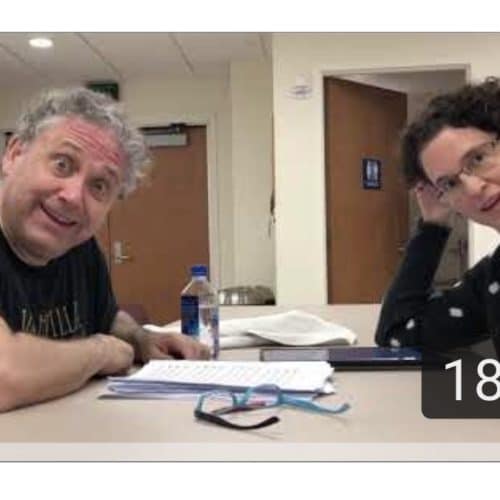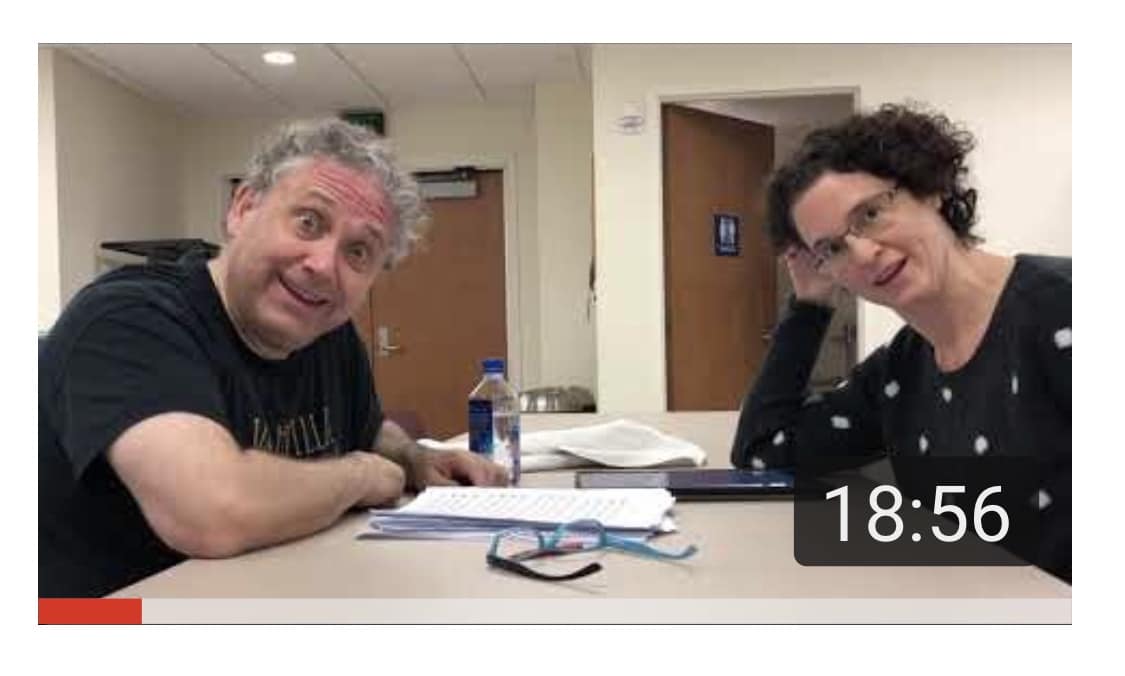Richard Egarr: Mozart expected us to applaud between movements
mainAnthea Kreston grabs an exclusive interview with the director of Ancient Academy of Music, and Artistic Partner to the Saint Paul Chamber Orchestra.
The Mozart quote comes around 10:30.
Watch.







Mozart would have undoubtedly called the Internet a “tool of Satan” too.
Not sure. “My” Beethoven would probably dislike of the net, but “my” Mozart would probably have a FB page well filled with gossip and YouTube links. Anyway, such speculations are very bizarre, don’t you think so?
Ya know, Richard, I really don’t care. I no more like applause between movements than I like someone coming and standing between me and a Rembrandt in an art museum. Both are intrusive.
Well said.
I don’t think Mozart was familiar with 2,000 seat concert halls and the possible distractions that they allow.
I find it hard to believe that he would disapprove of so many people being engrossed by his music. I’m not an expert on the man but I suspect that he would have seen the potential of a large concert platform and a sizeable audience.
I honestly disagree very much with the sentiment. Interactivity is all well and good on paper, but so much of the value and magic of music (especially Mozart) comes best with immersion and a free, meditative mind. As Daniel Barenboim said, to paraphrase; to truly listen to music one must give of themselves as if to a lover. I agree; this kind of open heart and vulnerability is crucial. Raucous noise and coughing (by God, so much coughing…) and shouting does not aid in that spiritual environment that so many listeners and performers crave and require, respectively.
I also dislike Richard’s indignant and offended attitude on the matter, as if such noise, applause and “throwing things” is inherently owed to him and as consequence, we are all being wronged by being denied such.
In all, a rather bothersome interview and sentiment. Mozart himself detested loud noises. “Silence in between the notes” as is attributed to him, is just as important in creating the artistic atmosphere. Silent rumination between movements allows the ear to digest and prepare for emotional transition. Could anyone honestly condone a blaring interruption between the first and second movements of Mozart’s Concerto No. 23, KV 488? That would be disgusting. Advocating for noise pollution throughout would seem a wrong approach on many levels.
If he wishes that people shout and boo and throw things (all his words) he should suggest a live Rock concert or something in THAT arena… we can find plenty of that there.
One of my sources indicates that “Silence in between the notes” comes from Debussy.
True enough MidwestMaestro! This quote seems difficult to cite directly, hence why I attributed it. In any case, I’d presume Mozart with his intimate, poignant style and famous cadences would agree in how indispensable silence is.
I very much like how many layers that thought actually has. It’s a very advanced concept in music isn’t it? I would venture to say it is a contributing factor as to why Mozart is the “most difficult” composer to interpret.
I think it should depend on the piece, and not on either dogma (all classical music is sacred) or unreflective practice (that’s how it’s done) or even historical practice (that’s how Mozart did it).
There are showy concerti that I think is downright disrepectful NOT to applaud after each movement. Then there are contemplative pieces that should not be applauded even at the end of the entire piece.
One thing is a constant: musicians always appreciate the applause, the more the better.
That is frankly an ignorant statement. No one wants their mood creation, their train of thought to be interrupted. It is jarring to have inappropriate applause.
Hoping for lots of applause in all the right and maybe the wrong places too in The Grange Festival’s Figaro next year directed by the wonderfully iconoclastic and brilliant Maestro Egarr
An interview is not a therapy session.
Hi all – in Basel tonight with Quartet, playing in the magnificent St. Leonhardskirche – all I can say is that these past two weeks have been incredibly energizing – just to be around people with a diverse set of priorities – all opinions welcome, and a healthy smattering of historical knowledge. We are lucky to be able to live with one foot in the past, and one in the present. I am feeling very lucky…..
Knowing the context during Mozart’s days is very interesting – and nothing new. We can always draw ideas. Some may work again. Personally, I have no interest in hearing unrelated works between movements and applauding indiscriminately.
In many opera performances people start applauding after the singer’s last note and before the ochestral coda is over. What purpose does that serve? What would they loose by hearing the entire orchestral coda?
To use that as an excuse to encourage it now is utterly ridiculous. This guy must be a sham. This is an old bush that has been beaten to death.
“No artist deserves the title of ‘virtuoso’ unless his extemporizations could pass for written compositions.”
—Ludwig van Beethoven
An interesting thing – the Curtis Institute, just this week, announced the beginning of a new degree in Classical Improvisation. The first in North America. This is what Richard is talking about. To simplify his comments into whether or not people applaud in culturally or historically appropriate places is to miss the entire point. We all know that traditions have changed. What he is talking about is the forced formality of current concert situations. And whether that is a good or bad idea. Does it include or exclude. What are the parameters?
Here is information about the new Curtis program. I certainly would have loved to do that as a student. It was very recently, as Richard mentions, that musicians improvised between pieces. All musicians. Read on here – and kudos to Curtis for taking the broad view here!
From the Curtis website…and you can read more here:
https://www.curtis.edu/academics/degree-programs/certificate-in-improvisation/
Performance Certificate in Improvisation
Noam Sivan, D.M.A., Director of Improvisation
Improvisation, the creation of music in real time, is perhaps the most widely practiced type of music-making around the world and has been influential in shaping the history of Western music from its inception. For many centuries it was considered the peak of musical creativity, combining performance and composition at the highest level. Bach, Mozart, Beethoven, Paganini, Chopin, and Liszt are well-known examples of composers who were known as master improvisers. Today, after a decades-long decline within the Western classical tradition, improvisation is on the rise.
Andrea writes “What he is talking about is the forced formality of current concert situations… Does it include or exclude.”
Err…the thoughts here are a muddle. Yes, of course some people are inhibited by the formality of concert etiquette, especially the first time someone attends a performance. But the “etiquette rules” are there to ensure that individuals don’t spoil the enjoyment of others. Getting rid of these social rules excludes many people who would otherwise enjoy the concert.
Social rules, of course, place limits on what you can do…but that is the point. Your rights are curtailed to ensure you don’t make other people’s experience worse. This is true in all social situations, not just the concert hall.
A fairly pleasant personal interview, but a very “trying to be with-it” type of viewpoint, the intrusive applause, boos, etc, during musical performance. Personally, i heartily dislike and disapprove of such attitudes, but i think the historical changes are not understood here, or certainly not adequately explained.
Most classical, (in the general sense) composers we know today are played just because they were ahead of their time; their “pop” contemporaries, seeking instant applause, have mostly vanished into the mists of history. There was certainly an element of pragmatism, even in great compositions, opera, for instance, is the best example with passages specially written to allow applause to die down, etc, but this wouldn’t have been an overriding element in Beethoven, Brahms…(onwards), or even late Verdi, criticised for not having true arias and moments to stop the action for audience participation.
So audiences evolved, up to a high point, (when?…mid/late 20th century?), where appreciation was concentrated on the pure musical matter. The greatest composers had been aiming at that ideal, even if they could only imagine it in their lifetimes and usually didn’t live to see it realised fully. To wish to regress to the constant clapping/booing/chatting/exiting & entering any time, etc, is certainly no evolution either for music or its audience. That’s a lamentable confusion of cause & effect.
Admittedly, today, classical does itself no favors with contemp(tible)orary composers alienating eveyone except the limited numbore of specialists. Desperate attempts to be “with-it,” as here, are hopeless.
I wonder what would be Anthea’s reaction if audiences crunched crisps, slurped beer, chatted, applauded and booed during, or between movements of her cherished Schumann Quartets….!
the open toilet door is a bit irritating
The conductor Boris Brott frequently lectures his audiences to stay silent between moments. I saw Yannick Nezet-Seguin conduct Tchaikovsky’s 4th symphony and applause started after the first movement. He reacted by vigorously shaking his hand in a gesture that meant STOP IT. But at a concert in Springfield, MA I heard the conductor Kevin Rhodes tell the audience that he didn’t mind applause between movements at all. I did a quick google and see 3 major conductors say the same – Marin Alsop, Manfred Honeck, and Gianandrea Noseda.